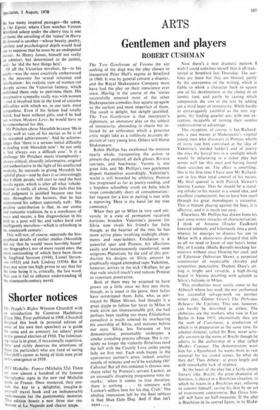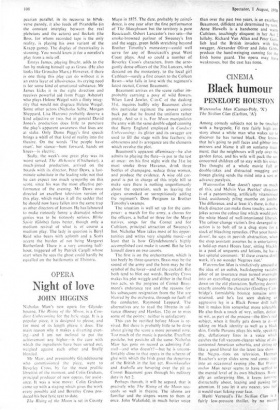ARTS Gentlemen and players
ROBERT CUSHMAN
The Two Gentleman of Verona (to say nothing of the dog) was the play chosen to inaugurate Peter Hall's regime at Stratford in 1960. It was by general consent a disaster, and the Royal Shakespeare Company must have had the play on their conscience ever since. Having in the course of the 'sixties successfully annexed most of the other Shakespearian comedies they square up again to the earliest and most imperfect of them. The result is delight, but delight qualified. The Two Gentlemen is that interpreter's nightmare, an immature play on the subject of immaturity, abounding in charm but in- fected by an artlessness which a generous critic might take as a ruthlessly accurate de- piction of very young love. Others will blame Shakespeare.
Robin Phillips has swallowed the mixture nearly whole, transporting the action to present-day popland, all dark glasses, Riviera sun-tans, and beachwear. Verona is one great lido, and Mr Phillips's two gentlemen disport themselves accordingly. Valentine's world is still bounded by athletics; Proteus has progressed as far as poetry-reading, and a hopeless schoolboy crush on Julia which stops considerably short of consummation : her request for a kiss at parting is met with a reproving 'Here is my hand for my true constancy.'
When they get to Milan (a very cool uni- versity in a state of permanent vacation) horizons broaden. Valentine's passion for Silvia now rivals his friend's for Julia though, as the heartier of the two, he has more active plans involving midnight elope- ments and rope-ladders. Emulation is a powerful spur and Proteus, his affections easily and instantaneously transferred, soon outgrows Platonism; by the end of this pro- duction his designs on Silvia amount to graphically-staged attempted rape. Valentine, however, arrives in the nick ('Ruffian, let go that rude uncivil touch') and reduces Proteus to repentant prostration.
Both of them may be assumed to have grown up a little since we first met them, though, as is usual in the genre, their ladies have outstripped them. Julia, who, as por- trayed by Helen Mirren, had thought it a great giggle to follow her lover to Milan in male attire (an impressionable girl, she had perhaps been reading too many Elizabethan comedies) is much sobered by overhearing his courtship of Silvia, and matures before our eyes; Silvia, less fortunate or less demonstrative, presumably undergoes a similar annealing process offstage. She is cer- tainly no longer the violently flirtatious (and the hell with the Courtly Love code) young lady we first met. Each ends happy in the appropriate partner's arms; indeed, another couple of minutes and we'd be watching Oh! Calcutta! But all this romance is thrown into sharp relief by Proteus's servant Launce; as an unusually discerning programme note re- marks: 'when it comes to true devotion, there is nothing . . . to compare with Launce's selfless love for his dog, Crab.' The abiding impression left by the final tableau is that Man Gets Dog. And if that isn't news
Now there's a neat dramatic pattern. I wish I could convince myself that it all tran- spired at Stratford last Thursday. The out- lines are there but they are blurred, partly by the unevenness of the writing, which is liable to whisk a character back to square one of his development at the clump of an iambic foot, and partly by casting which compounds the sins of the text by adding yet a third layer of immaturity. While hardly as extravagantly youthful as the text sug- gests, the leading quartet are, with one ex- ception, incapable of turning their surplus sophistication to advantage.
The exception, of course, is Tan Richard- son, a past master at Shakespeare's virginal young men who discovers in Proteus whorls of irony (see him convulsed at the idea of Valentine's 'corded ladder') and of poetry (he does the lyrical bits in a spotlight which would he infuriating in a richer play but serves well for this one) and having found them searches on. The effect is unsettling; this is the first time I have seen Mr Richard- son in less than total control of his means.
My final quarrel is with Patrick Stewart's louring Launce. That he should be a stand- ing rebuke to his master is a sound idea, and excellent counterpoint; but to have him snarl through his great monologues is excessive. This is blatant playing against the lines, it is effective, and it is much too easy.
Elsewhere Mr Phillips has drawn from his cast some minor miracles of characterisation.
I think of Antonio (Trader Faulkner) lowered solemnly and hilariously intaa pool, whence he emerges to dismiss his son to Milan with a plutocratic disregard that tells us all we need to know of our hero's home life; of Lucetta (Sheila Burrell) mocking her
mistress without once blowing her cool; and of Eglamour (Sebastian Shaw), a perpetual scoutmaster of impeccable chivalry and scrupulous punctuality. Daphne Dare's set- ting is bright and versatile, a high-diving board in Verona doubling with aplomb as Silvia's balcony in Milan.
This production must surely come to the Aldwych where last week the RSC performed
less successful salvage-work on another
minor play, Canter Grass's The Plebeians Rehearse the Uprising.-This one, however,
can hardly be described as artless. The plebeians are the workers who rose in East Berlin in June 1953: alternatively they are the mob of Coriolanus, a production of which is in preparation at the same time. Its adaptor-director, called the Boss, never actu- ally answers to the name of Brecht though he admits to the authorship of a play called Mother Courage. The demonstrators want him for a figurehead; he wants them as raw material for his crowd scenes. So what do they do? They debate: at great length and with remarkable lack of urgency.
At the heart of the play lies a fairly simple literary joke. Brecht, the great dramatist of foxiness, is placed in a Brechtian situation, to which he reacts in a Brechtian way, refusing to commit himself, saving his skin by an act of transnarent compromise. But Grass him- self will have no half-measures. If the play is Brechtian in its central figure. in its Shake- pearian parallel, in its recourse to blank- verse parody, it also feeds off Pirandello (in the constant interplay between the real plebeians and the actors) and Beckett (the Boss, for whom recorded tape is the only reality, is playing his own variant of the Krapp game). The display of theatricality is stunning. You would know it for a novelist's play from a mile off.
Emrys James, playing Brecht, adds to the fun by making himself up as Grass. (He also looks like Groucho Marx.) However, if there is one thing this play can do without it is an extra layer of allusiveness. Its crying need is for some kind of emotional substance. Mr James kicks it in the right direction and receives powerful aid from Peggy Ashcroft who plays Helene Weigel with a flinty integ- rity that would not disgrace Helene Weigel. Some other actors (Nicholas Selby, Morgan Sheppard, Lisa Harrow) probably deserve a kind adjective or two, but in general David Jones's production does little to puncture the play's apparent awareness that lives are at stake. Only Dame Peggy's first speech brings a whiff of that kind of reality into the theatre. On the words 'The people have risen', her stance—bent forward, hands on knees—is electric.
Sadly, the week's one great play was its worst served. The Alchemist (Chichester), a much-jinxed production, arrived on the boards with its director, Peter Dews, a last- minute substitute in the leading role; not that he can expect too much sympathy on this score, since his was the most effective per- formance of the evening. Mr Dews once directed an excellent television version of this play, which makes it all the sadder that he should now have fallen into the same trap as other directors of Jonson. He has laboured to make riotously funny a dramatist whose genius was to be riotously serious. Blithe Spirit (Globe) fares better, though only a medium revival of what is of course a medium play. The lady in question is Beryl Reid who bears with aplomb and a Scots accent the burden of not being Margaret Rutherford! There is a very amusing half- hour, triggered off by Patrick Cargill whose start when he sees the ghost could hardly be equalled on the battlements of Elsinore.































 Previous page
Previous page